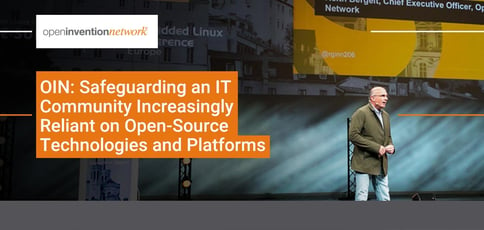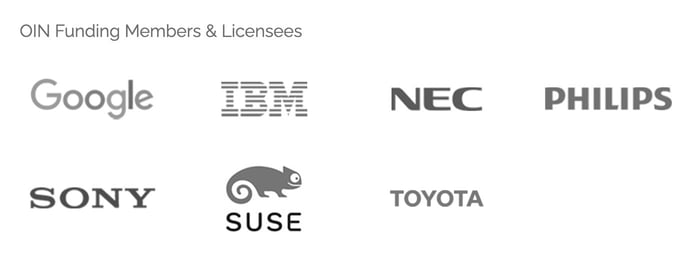
TL; DR: Since 2005, Open Invention Network (OIN) has been on a mission to protect users of Linux and other open-source technologies via the world’s largest patent non-aggression community and shared patent pool. The organization, now representing more than 3,300 members from over 100 countries, is continuously growing community membership by engaging a diverse set of companies across various industries. As Linux servers become increasingly relevant in our daily lives — as most recently exemplified in the COVID-era push toward digital transformation — OIN’s mission to protect open-source innovation is becoming even more critical.
In addition to the severe and sometimes fatal complications COVID-19 has unleashed on victims across the globe, the pandemic has affected the operations of nearly every business on the planet. Not only were many executives forced to allow employees to work from home, but they also were challenged with adapting to changing customer demands.
According to Keith Bergelt, CEO at Open Invention Network (OIN), these changes put increased pressure on information technology resources, driving enhanced focus on the adaptability and cost-efficiency of IT systems.
In this new reality, Keith told us that he’s seen significant adoption of open-source software (OSS), one of the most significant innovation engines in the information and communication space. He said the trend spans a range of industries — from healthcare and financial services to logistics, transportation, and cybersecurity.

Keith Bergelt, CEO, gave us an update on how OIN is helping businesses thrive in the COVID era.
“For example, new platforms in healthcare IT are being developed every day,” he said. “Telemedicine vendors are leveraging copious amounts of open-source to build their systems. We also see massive adoption of embedded Linux in healthcare products. Additionally, these products and platforms often leverage networked handheld devices that connect to large back-office systems. There is really no part of healthcare infrastructure where OSS is not relevant.”
As the adoption of Linux and other OSS projects continues to grow, the OIN team is constantly looking to hinder patent aggressors, enabling organizations to leverage Linux solutions and adjacent OSS technology. Keith told us investment in this core technology involves a shared development cost that ensures it is safe to build upon OSS from a patent perspective. This allows organizations to concentrate their resources higher in the technology stack – dramatically increasing the pace of innovation.
“As businesses increase their adoption of open-source, most recognize the benefits of shared innovation at the building block level,” he said. “They also look for ways to protect their investments in the code they have developed or use. By joining a patent non-aggression community like ours, they are publicly demonstrating their commitment to OSS, while benefiting from the shared protection our community provides.”
A Robust Non-Aggression Community Established in 2005
OIN was established in 2005 by a group of forward-thinking organizations led by IBM, NEC, Red Hat, Philips, Sony, and SUSE who recognized the potential of open-source technology. Toyota and Google later joined the organization as board members and financial supporters of OIN’s mission.
Keith said that, early in OIN’s history, computer companies primarily used OSS when making servers.
“Since that time, open-source has become ubiquitous,” he said. “It powers everything from smartphones and toys to banking networks and search engines — as well as almost everything in between. Today, many industries invest heavily in OSS because of the benefits of shared technological innovation, which has been a key driver of open-source growth.”
Companies in such industries are increasingly joining patent non-aggression organizations like OIN because they want to feel safe in their open-source investments. “Ours is the largest patent non-aggression community in history because companies large and small see the value provided by shared innovation, and they wish to standardize on core open-source functionality without fear of patent infringement claims or litigation,” Keith said.
Today, OIN is the largest patent non-aggression community on the globe. In addition to mitigating patent risk in core software authored by open-source projects and creating assurance for companies seeking to adopt OSS, it supports freedom of action in Linux as a critical element of OSS. Thanks to OIN’s work, patent non-aggression has become a cultural norm within the OSS space, serving as a litmus test for behavior in the open-source community.
This is especially relevant amid increased use of cloud computing, server networking, and edge-hosted IoT solutions spurred by the ongoing pandemic.
“Due to COVID-19, there has been an unprecedented scaling in the use of networking and communications platforms that are almost exclusively anchored by Linux servers,” Keith said. “Additionally, a significant percentage of the platforms are comprised of OSS code. Cloud computing — in tandem with the advanced communications networks, premise devices, interceding communications platforms, and security needed to protect it — increasingly relies on OSS.”
He said that businesses and consumers are requiring more reliable and efficient products and services based on cloud servers. Therefore, OIN must ensure that these parties can innovate and operate effectively.
“We have and will continue to protect core open-source technologies as the library of these building-block level technologies continues to grow over time,” he said.
Empowering Organizations to Reduce Patent Risk and Boost Innovation
Open-source technologies have essentially created a new path to innovation featuring core building blocks that are constantly being improved and shared globally. Organizations that join OIN demonstrate respect for the open-source movement and commit to the obligations required of an authentic participant in the global community.
“The only companies that do not sign our license and agree to participate in our community are those that ultimately wish to reserve the right to use their patents to sue on core Linux and OSS functionality,” Keith explained.
OIN’s value comes from its royalty-free cross-license, enabling patent peace in core technologies while supporting innovation in Linux and other important open-source projects.

Funding members are vital in their financial support of OIN’s mission.
“Every community member receives royalty-free access to the Linux System’s patents of the 3,300 other licensees, which in aggregate own over 2.6 million worldwide patents and applications via the OIN cross-license,” he said.
Of course, organizations receive numerous other benefits when joining OIN, including better collaboration between stakeholders in the open-source and IP environment, protecting patent-related threats to Linux, and the ROI inherent in adopting a philosophy centered on open-source.
“Perhaps the most important benefit derived from joining OIN is the ability for businesses and organizations to comfortably invest their resources to develop, integrate, and use open-source software — while resting assured that they are safeguarded from patent risk in core Linux and adjacent open source technologies,” Keith said.
Protecting Open-Source Software from Patent Trolls
Keith told us the organization has recently shifted its focus toward reducing the risk associated with patent assertion entities (PAEs); colloquially known as patent trolls. These entities generate revenue by acquiring patents from third-party sources and asserting those patents against alleged infringement cases.
“PAEs monetize their patents primarily through licensing negotiations with alleged infringers, infringement litigation, or both,” he said. “In other words, PAEs do not rely on producing, manufacturing, or selling goods. Instead, they leverage patent assets taking advantage of alleged infringers’ general preference to settle rather than bear the high costs of taking a patent suit to term.”
OIN has recently made important investments to limit the negative impact of PAEs on companies that adopt open-source solutions. For example, the group is partnering with IBM, the Linux Foundation, and Microsoft to further protect OSS from PAEs through a shared investment in the Unified Patents Open Source Software Zone.
The effort is intended to broaden the scope of OSS protections while balancing OIN’s defensive support activities between the mitigation of risks related to operating companies and PAE patents.
As for what the future holds, members can expect some significant announcements in the fourth quarter of 2020.
“Rest assured, we can be expected to continue to employ our capital to reduce patent risk and to look for creative ways to facilitate freedom of action for the growing number of companies seeking to adopt and integrate open-source code,” Keith said.
HostingAdvice.com is a free online resource that offers valuable content and comparison services to users. To keep this resource 100% free, we receive compensation from many of the offers listed on the site. Along with key review factors, this compensation may impact how and where products appear across the site (including, for example, the order in which they appear). HostingAdvice.com does not include the entire universe of available offers. Editorial opinions expressed on the site are strictly our own and are not provided, endorsed, or approved by advertisers.
Our site is committed to publishing independent, accurate content guided by strict editorial guidelines. Before articles and reviews are published on our site, they undergo a thorough review process performed by a team of independent editors and subject-matter experts to ensure the content’s accuracy, timeliness, and impartiality. Our editorial team is separate and independent of our site’s advertisers, and the opinions they express on our site are their own. To read more about our team members and their editorial backgrounds, please visit our site’s About page.

